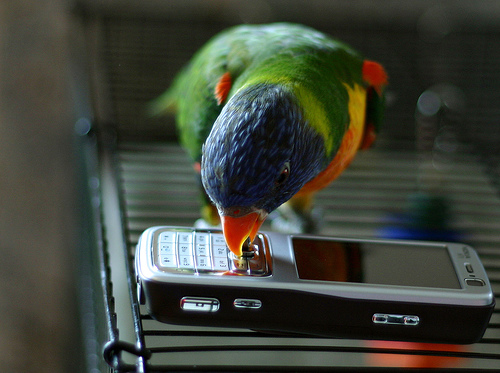URL: rewiredstate.org/projects/sms-centre-finder
There are 61 million people in the UK and 10 million of them have never used the Web.
How would you help someone to get online for the first time?
The job of the Government’s UK Online Centres is to help bridge the digital divide, by providing places with free public Internet and hands-on assistance. We recently helped them to explore a new web strategy, as part of a prototyping session at Google London, which was organised by Rewired State.
First steps on the Web, thanks to an SMS text message
People seek out a UK online centre for a number of reasons: to get help emailing their children who are overseas, to fill in a job application that’s available only on the Web, or to join Facebook because their grandchildren are all on there.
But there’s an interesting fact: around 70% of these first-timers have a mobile phone. What if we could take advantage of that fact to make it easier for them to get the help they need?
I worked with Sym Roe, Tom Hume and Daniel Morris on a prototype to explore this question. In just a few hours, we had created an SMS text message service, which allows people to text their postcode to a short phone number, and be texted back details of their nearest UK Online centre.
How it could work
Imagine that you’re out and about. You see a poster on the wall at a community centre, a library or some other noticeboard, and it says:
Want to get online? To find your nearest UK online centre, send a text message to 82958 saying ‘ukonline’ plus your postcode – e.g. ‘ukonline SW1A 2AA’.
We’ll text you back with your nearest centre. This service costs 25p.
You can try it out with your own postcode. Did you realise that there’s a centre so close to you?
Ingredients of an SMS web service
We took advantage of the really easy-to-use SMS service, Taykt (it’s pronounced “take it”), a new startup based in Brighton. It takes the pain out of dealing with mobile networks and registering shortcode phone numbers.
First, we chose a keyword for users to start their SMS message with – in our case, we chose “ukonline“. Taykt then passes through to our web service any message that starts with that keyword. If no postcode is supplied, then we just give a generic response. If there is a postcode, then we convert it to a latitude and longitude, then query the UK Online database to find the nearest centre.
To make best use of the 160 characters available in our text message response, the information we send back is prioritised: first the centre’s name and phone number is given, and then if there’s still room in the message, we give the address, and then information about creche facilities, disabled access, etc. We try keep it concise, but human-friendly. Tom wrote about his work on maximising the text message response on his blog.
Because Takyt lets us pass on the cost of the service to the end user (25p per request), it means it would be a viable proposition for UK Online to get up and running quickly, with little risk or upfront fees.
If you’d like to check out the code, see Sym’s Django-based web service, and Chris Thorpe’s UK Online API.
There’s a write-up of our SMS Centre Finder project on the Rewired State website.

3 Comments
Thanks to Prem, Sym, Tom and Daniel we’ve now taken this forward into full implementation. We’re going to promote the number (a new one 80809) and the word (online) during October to piggy back on all the activity that’s going to be generated by Get Online Week and the BBC’s First Click campaign.
The real breakthrough here was that this solution means that we at UK online centres don’t have to take any risk that a text back service is hugely successful and therefore expensive. We want loads of people to use the text back service but we can’t have an open ended amount in our budget.
It’s great that we’ve gone from a prototyping workshop to a full implementation is less than two months. Thanks again to Prem, Sym, Tom and Daniel.
Hi Helen,
Great stuff. I’m really glad that our little prototype has been made into a live app so swiftly. I look forward to hearing what the response has been like.
P
Yes! to work in Internet is no harder that use a mobile phone.I will recommend this method to my parents? they are first-goers too.